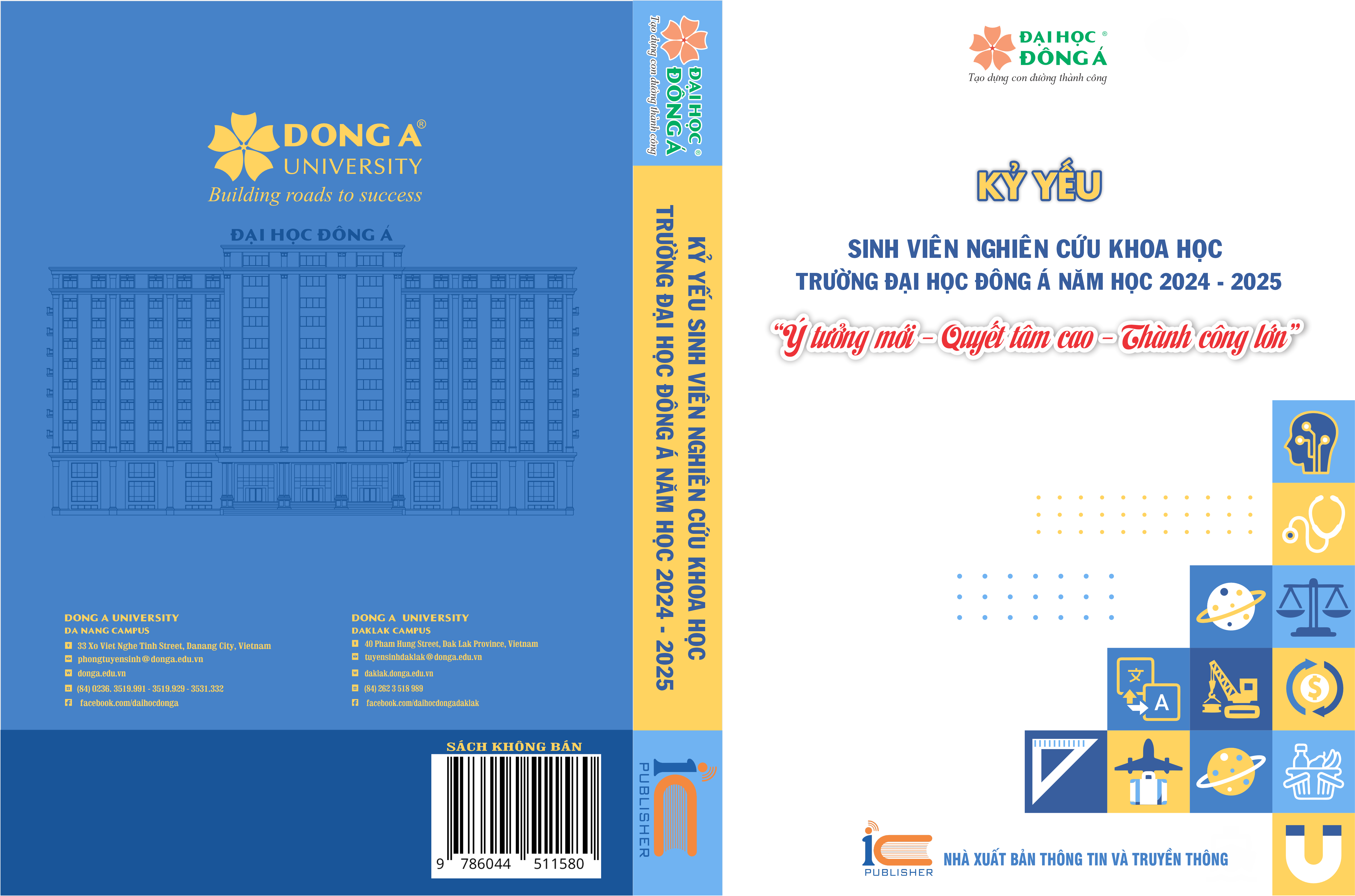A STUDY ON THE PERCEPTIONS OF USING CHATGPT AS AN AI WRITING ASSISTANT AMONG THIRD-YEAR ENGLISH MAJORS AT DONG A UNIVERSITY
Main Article Content
Abstract
In the 4.0 era, AI technology continued to develop to support humans. ChatGPT, developed and produced by OpenAI, was launched at the end of 2022 and has become a phenomenon due to the benefits it offers, especially in the process of learning English. This study examined the perceptions of using ChatGPT as an AI writing assistant among third-year English majors at Dong A University. Suggestions were also made to improve the use of ChatGPT as an AI writing assistant for students. The study involved 90 students at Dong A University and employed a quantitative method. A questionnaire was used to determine students' perceptions of the effectiveness and challenges of using ChatGPT, as well as to propose suggestions for its effective use as an AI writing assistant. The results were expected to show that students generally have a positive attitude toward the benefits provided by ChatGPT, although they may still encounter challenges related to its implementation. Additionally, several suggestions were made for more effective use of ChatGPT as an AI writing assistant.
Article Details

This work is licensed under a Creative Commons Attribution-NonCommercial-NoDerivatives 4.0 International License.
Keywords
ChatGPT, Perceptions, AI Writing Assistant, Third-year English Majors, Dong A University
References
Al-Garaady, J., & Mahyoob, M. (2023). ChatGPT's capabilities in spotting and analyzing writing errors experienced by EFL learners. Arab World English Journal (AWEJ), Special Issue on CALL, (9), 3–17. https://doi.org/10,24093/a wej/call9.1
Alenezi, H. (2024). Impact of ChatGPT on ESL students’ academic writing skills. Smart Learning Environments, 11(1), 1–13. https://doi.org/10,1186/s40561-024-00295-9
Ali, H. I., Almusharraf, N. M., & Khan, A. R. (2023). Student Perceptions of ChatGPT in Academic Writing: Opportunities and Challenges. International Journal of Emerging Technologies in Learning (iJET), 18(10), 115–130, https://doi.org/10,3991/ijet.v18i10,37561
Alshenqeeti, H. (2014). "Google Forms: A Reliable Tool for Data Collection in Research." International Journal of Academic Research in Business and Social Sciences, 4(6), 123–134.
Athanassopoulos, V., Petropoulou, Z., & Theofanous, A. (2023). Exploring ChatGPT’s Potential in Higher Education: A Study on Student Acceptance and Use. Journal of Educational Technology & Society, 26(1), 85–98.
Baskara, F. R. (2023). Challenges of using ChatGPT in academic writing: Ethical concerns and critical thinking. Journal of Educational Technology, 15(1), 78–92.
Cambridge Dictionary. (n.d.). Perception. Retrieved from https://dictionary.cambridg e.org/ .
Chang, S. (2011). The role of English as an international language and its impact on intercultural communication. Journal of Language and Culture, 12(2), 45-58.
DigitalOcean. (2023). AI writing tools: Beyond standard text editing for refined content creation. DigitalOcean Blog. Retrieved from https://www.digitalocea n.com/blog
European Commission's High-Level Expert Group on AI, "Ethics Guidelines for Trustworthy AI," 2019.
Finch, M. (2019). The Power of Google Forms: How to Simplify Data Collection. Pearson Education.
Flower, L., & Hayes, J. R. (1981). A cognitive process theory of writing. College Composition and Communication, 32(4), 365–387.https://doi.org/10,2307/35 6600
Google Documentation. (2006). Google Docs Editors Overview. Google.
Halaweh, M. (2023). Using ChatGPT in Academic Contexts: A New Era of Digital Assistance. International Journal of Education and Learning, 12(3), 45–59.
IELTS IDP. (2024). IELTS Writing Skills: Tips and Preparation. Retrieved from http s://ielts.idp.co m/vietnam/prepare/article-ielts-writing-skills
Isenberg, S. (2024, February 2). What Are Writing Skills?. iConnect. Retrieved from https://iconnect.i senberg.umass.edu/blog/2024/02/02/what-are-writing-skills/
Kumar, S., & Javed, M. (2024). The effectiveness of AI-powered writing assistants in enhancing essay writing skills at the undergraduate level. International Journal of Educational Research and Innovation, 19, 65–82. https://www.resea rchgate.net/publication/389302208
Launonen, P., Talalakinа, E., & Dubova, G. (2024). Perceptions and usability of ChatGPT among university students: A study on its integration into academic writing processes. Półrocznik Językoznawczy Tertium, 9(1), 241-243.
Murray, D. M. (1972). Teach writing as a process, not product. The Leaflet, 1(1), 11-15. Available at: https://mwover.com/wp-content/uploads/2018/05/murray-teach-writing-as-a-process-not-prod uct.pdf
Ngo, T. T. A. (2023). Artificial Intelligence Integration in Vietnamese Education: Trends and Applications. Vietnam Journal of Educational Studies, 5(2), 12–23.
Nguyen, A. T., & Le, H. T. (2024). What college students learned from utilizing ChatGPT for a writing assignment. Education Sciences, 14(9), 976. https://doi.org/10,3390/educsci14090976
Nguyen, T. M., Tran, L. H., & Pham, V. T. (2024). Perceptions of third-year ELT students on using ChatGPT as an AI writing assistant. The University of Danang Journal of Educational Research, 17(2), 99-113.
Rao, P. S. (2019). English as a tool for academic writing and research. Journal of Educational Development, 8(3), 112-126.
Robbins, S. P., & Judge, T. A. (2017). Organizational Behavior (17th ed.). Pearson Education. Retrieved from https://www.oreilly.com/library/view/organizational-behavior-17e/978 01341 03983/
Saha, P., & Chowdhury, A. (2024). Analyzing the role of ChatGPT as a writing assistant at higher education level: A systematic review. Contemporary Educational Technology, 16(1), Article ep436. https://doi.org/10,30935/cedte ch/13605
Scribbr. (2023). AI writing tools in academic writing: Enhancing productivity and content creation. Scribbr Blog. Retrieved from https://www.scribbr.com/ai-writing-tools
Võ, X. H., & Nguyễn, H. K. (2024). English-majored students’ perceptions of using ChatGPT in English writing. International Journal of Social and Management Studies, 7(4), 109.
Wahle, J. P., et al. (2022). Evaluating the quality of AI-generated content: Insights from impartial assessments. Journal of Artificial Intelligence and Education, 16(3), 142-159.
Wolfram, S. (2023). What is ChatGPT doing and why does it work? Wolfram Media.
Zúñiga, L., & Goyanes, M. (2021). A Scholarly Definition of Artificial Intelligence and its Applications. Semantic Scholar. Retrieved from https://www.semantic scholar.org/paper/A-Scholarly-Definition-of-Artificial-Intelligence-a-Z%C3%BA%C3%B1iga-Goyanes/a228d95 7305ea1d435e53642546e1d626055b0e d


